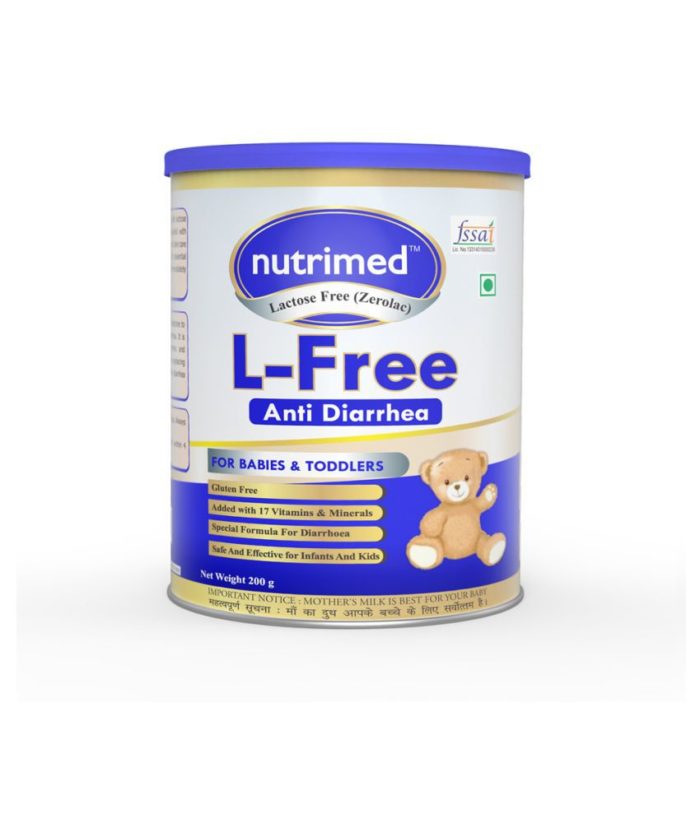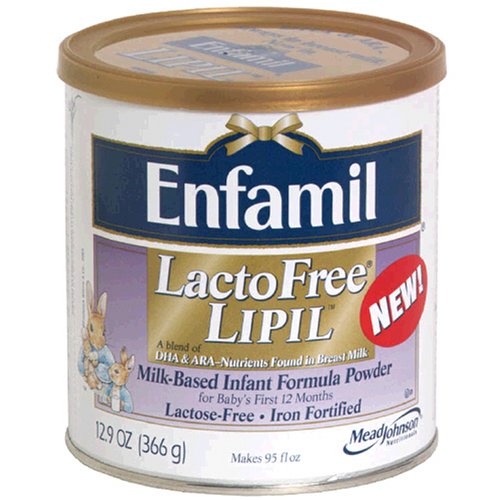Lactose intolerance, a perplexing condition among infants, arises when the little one’s body fails to break down lactose – a sugar found in milk and dairy products. The aftermath of this deficiency is not only discomforting but also bursty – bloating, gas, and diarrhea are just some of the symptoms that can leave you scratching your head in bewilderment.

If your baby has been diagnosed with this enigmatic disorder, switching to a lactose-free formula may be necessary. These specialized formulas cater explicitly to babies who find it challenging to digest lactose while providing all the critical nutrients essential for proper growth and development.
Choosing an appropriate formula for your baby’s digestive needs can be overwhelming; thus, consulting with your pediatrician is vital. Your physician will help you figure out if opting for soy-based alternatives or hypoallergenic formulas devoid of cow’s milk protein would be best suited for your child. Moreover, reading labels carefully before selecting any infant formula could make all the difference in ensuring optimal health outcomes for your bundle of joy!
The Benefits of Choosing Lactose-Free Formula for Your Baby
Choosing the perfect baby formula can be a perplexing task for parents, especially when lactose intolerance comes into play. The mere thought of their infant struggling to digest lactose – an innocuous sugar found in milk and dairy products – is enough to cause a burst of concern among parents. But there’s no need to fret! Lactose-free formulas are here to save the day by providing all the essential nutrients that your little one needs without causing any tummy troubles.

It’s not uncommon for babies with lactose intolerance to experience gas, bloating, diarrhea and abdominal pain owing to insufficient production of lactase enzyme required for breaking down lactose in food. However, switching over to lactose-free formulas can alleviate these symptoms while ensuring optimal growth and development.
On some occasions, though rare, babies may have allergies or protein intolerances that necessitate avoiding cow’s milk-based formulas altogether; soy-based options like Similac Soy Isomil or hypoallergenic alternatives could then come in handy. It goes without saying that consulting your pediatrician is crucial in determining what kind of infant formula would cater best to your child based on their distinctive requirements and medical history.
Exploring Different Types of Infant Formula: Lactose-Free, Soy, and More
The labyrinthine world of baby formulas can leave new parents feeling bewildered and overwhelmed. With so many options available, it’s difficult to know which one is the right fit for your little one. Among the myriad choices are lactose-free formulas, specifically tailored for infants with lactose intolerance. These milks contain all of the essential nutrients found in milk-based formulas without any pesky lactose that might cause gastric distress.
But wait – there’s more! Another contender in this convoluted arena is soy formula, made from plant-based protein rather than animal-derived protein. This option may be recommended by a pediatrician if your child has an allergy or sensitivity to cow’s milk proteins. However, it ought to be noted that some babies who are allergic to dairy may also have adverse reactions to soy products.
When navigating this maze-like terrain of infant nutrition, it is critical to work closely with medical professionals such as your pediatrician. They can help pinpoint any possible allergies or intolerances and offer suitable alternatives like hypoallergenic or amino acid-based formulas. Ultimately, discerning the perfect formula for your unique offspring will ensure they receive optimal nourishment crucial for healthy development and growth.
How to Identify Milk Allergies and Protein Intolerance in Your Baby
The perplexing task of identifying milk allergies and protein intolerance in infants is enough to cause new parents a great deal of worry. Fussy behavior, colic, loose stools or constipation are all symptoms that can make your baby’s discomfort palpable. Although breast milk reigns supreme as the best option for newborn feeding, sometimes it’s just not an option due to unforeseen circumstances.
If you suspect that your precious little one is suffering from a milk allergy or protein intolerance, selecting the right formula can be quite challenging. Traditional milk-based formulas may contain lactose which could exacerbate symptoms in babies who are lactose intolerant. However, there are alternative low-lactose options such as hydrolyzed or partially hydrolyzed formulas available on the market that break down proteins into smaller pieces; thereby making them easier for digestion.
Another viable choice is soy-based formulas like Similac Soy Isomil which does not use dairy products but instead incorporates soy protein isolate as its main ingredient. If severe symptoms persist despite dietary changes and switching formulas then hypoallergenic versions may be worth exploring further.
It is crucial to monitor any alterations in bowel movements and general demeanor when introducing a different type of formula for infants with suspected allergies or intolerances. If persistent signs arise even after implementing these adjustments, seek professional assistance from your pediatrician who will suggest additional testing and customized treatment options suitable for your child’s needs.\n
Choosing the Right Formula for Your Baby’s Digestive Needs
In determining the optimal formula for your infant’s digestive requirements, numerous considerations must be taken into account. Infants who suffer from lactose intolerance or gastrointestinal difficulties may necessitate a formula devoid of lactose or one derived from soy rather than conventional cow’s milk-based formulas. It is critical to recognize that not all infants will respond similarly to various types of formulas; therefore, discovering the appropriate one for your child may involve some experimentation.
If you suspect that your newborn has an allergy to cow’s milk or cannot tolerate traditional cow’s milk-formulas, then transitioning to either a lactose-free baby formula or a soy-based alternative could be imperative. These formulations do not contain any cow’s milk protein and can help alleviate symptoms such as fretfulness, flatulence, bloating, and diarrhea in infants struggling with normal cow’s milk-based formulas.
It is also essential to acknowledge that just because one type of formulation does not work for your child does not imply that another kind will fail likewise. Certain little ones might need more specialized hypoallergenic alternatives if they persist in experiencing discomfort on other sorts of formulas. In conclusion, seeking guidance from a pediatrician can aid in identifying which category of baby formula is optimally tailored towards addressing your infant’s unique digestive demands.
The Role of Pediatricians in Recommending Lactose-Free Formula for Infants
Perplexing as it may seem, the selection of appropriate baby formula is a matter that requires careful consideration. The role of pediatricians in this regard cannot be overstated – they are the gatekeepers to your child’s digestive health. If you’ve noticed signs such as colic, gas, or fussiness after feeding your little one cow’s milk protein-based formulas made with cow’s milk, then switching to lactose-free options could be just what the doctor ordered.
But hold on! Don’t jump to conclusions just yet. Not all babies need lactose-free formula – some can handle milk sugar without batting an eyelash. So how do you know if it’s time for a change? Well, if your bundle of joy seems particularly irritable and intolerant towards lactose or whey protein and casein protein found in cow’s milk formula, consulting with a pediatrician would be wise.
Now comes the burstiness…When considering making the switch to lactose-free infant formula (for those who suffer from colic and other digestive discomforts caused by regular formulas containing lactose), it is absolutely imperative that you seek out professional advice before attempting any DIY solutions. With so many brands vying for attention on store shelves, navigating this minefield can feel overwhelming at best.
Thankfully though, pediatricians are well-versed in guiding parents through this process. They’ll help identify which brand contains all the necessary nutrients suitable for your child’s age group while also ensuring that their nutritional requirements are met adequately.
Switching to Lactose-Free Formula: What to Expect During the Transition
The transition to lactose-free formula for your baby can be a perplexing experience. It’s crucial to comprehend what you should anticipate during this period of change. Primarily, it’s essential to note that not all lactose-free formulas are created equal. Some formulas still contain milk proteins that may cause gas and fussiness in babies diagnosed with lactose intolerance or a protein allergy. In such cases, hypoallergenic baby formulas made with soy or hydrolyzed formulas burst forth as more suitable options.
If your pediatrician has suggested lactose-free formula for your child due to suspected lactose intolerance, then the transition should be relatively straightforward but no less bursting with questions and concerns. It is imperative to select a new formula that provides all necessary nutrients while being easy for the little one to digest so they continue growing and developing normally.
Furthermore, some babies may encounter mild digestive discomfort when switching from their old formula to a new one- regardless of whether it contains lactose or not! This realization might leave you feeling puzzled, unsure about what steps need taking next? But don’t panic; give your little one time to adjust while keeping an attentive eye out for any symptoms over the coming days and weeks until confidence in the new regimen is restored.\n
Hypoallergenic Baby Formula Options for Fussy and Colicky Infants
The digestive system of newborns is a work in progress and sometimes, it can’t handle lactose. This leads to discomfort manifested as bloating, gas, and fussiness – symptoms no parent wants their baby to experience. If you’re one of those parents struggling with an infant suffering from these woes, switching formulas might do the trick.
But what formula should you choose? The quest for the perfect solution for your fussy or colicky little one may leave you feeling bewildered amidst all the options out there. Some formulas are low-lactose while others are hypoallergenic; crafted especially for infants with protein intolerance. These specialized formulas contain just enough milk proteins that won’t cause unnecessary stress on your child’s developing gut.
For toddlers still grappling with digestion issues related to lactose or other food allergies, fret not! There’s a plethora of toddler formula options available in the market today. From soy-based formulations to hydrolyzed protein-based ones which provide essential nutrients without causing any tummy troubles – there’s something for everyone!
Of course, before embarking on any new dietary plan for your child, it goes without saying that consulting your pediatrician first is paramount.

